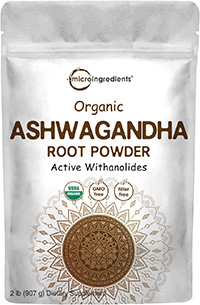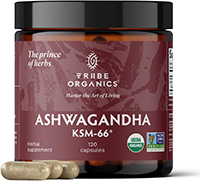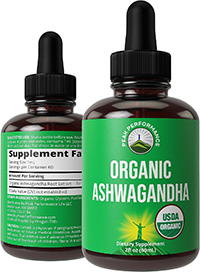Contents
- 1 Ashwagandha for Anxiety: Adaptogenic Properties
- 2 Anxiety’s Pervasive Presence
- 3 Delving into the Depths of Anxiety’s Symptoms
- 4 The Limitations of Conventional Anxiety Treatments
- 5 A Glimpse into Ashwagandha’s Legacy
- 6 Ashwagandha’s Impact on Cortisol
- 7 Unveiling the Power of Research
- 8 Embracing Restful Nights Despite Anxiety
- 9 Sharpen Your Mind Amidst Anxiety’s Clutter
- 10 Dosage: Finding Your Optimal Dose for Anxiety Relief
- 11 Ashwagandha for Anxiety: Unveiling the Choices
- 12 Seamless Integration
- 13 Maximizing Ashwagandha for Anxiety’s Effectiveness
- 14 Embracing a Holistic Approach
- 15 Personalized Care for Unique Needs
- 16 A Generally Safe Profile When Used Appropriately
- 17 Safety Precautions and Contraindications
- 18 Responsible Supplementation
Ashwagandha for anxiety relief: In the relentless symphony of modern life, where stress has become an unwelcome yet constant companion, anxiety has emerged as a formidable foe, casting a shadow of unease over countless individuals. Its relentless grip manifests in myriad forms, from persistent worry and restlessness to disconnection from the world around us. The intrusive thoughts, the relentless cycle of anticipation, the physical manifestations of muscle tension, disrupted sleep, and digestive issues – these are the hallmarks of anxiety. This insidious adversary robs us of our peace of mind and ability to fully embrace life’s experiences.
The conventional approaches to combating anxiety, while often effective, come with their own set of limitations. Pharmaceutical interventions may offer temporary relief, but they usually carry the risk of side effects and the need for ongoing dependence. Psychotherapy and counseling, while invaluable tools for understanding and managing anxiety, can be time-consuming and may not resonate with everyone.
Ashwagandha for Anxiety: Adaptogenic Properties

In this quest for a more holistic and natural approach to anxiety relief, ashwagandha, an ancient herb revered in traditional Indian medicine, emerges as a beacon of hope. For centuries, people have used this unassuming plant, also recognized as Indian ginseng or winter cherry, to promote overall health. It offers a natural way to alleviate anxiety and restore inner peace.
Ashwagandha’s remarkable effectiveness stems from its adaptogenic properties, which empower the body to adapt to stress and restore balance. By modulating cortisol levels, the stress hormone, and enhancing the activity of GABA, a neurotransmitter that plays a crucial role in comforting the nervous system, ashwagandha gently soothes the mind and body, fostering resilience and tranquility amidst life’s challenges.
Unveiling the science behind ashwagandha’s anti-anxiety prowess, we examine its impact on cortisol levels, its modulation of GABA activity, and the compelling clinical evidence supporting its efficacy in reducing anxiety symptoms and improving overall health.
Anxiety’s Pervasive Presence
Anxiety disorders affect nearly forty million adults in the United States, making it the most common mental illness in the country. This staggering statistic underscores the profound impact of anxiety on society, affecting not only individuals but also their families, workplaces, and communities.
Anxiety can manifest as persistent worry and rumination, an overwhelming sense of dread, irritability, restlessness, and physical symptoms like tension of the muscles, rapid heart rate, and shortness of breath. These symptoms can profoundly disrupt daily life, interfering with work and relationships.
Delving into the Depths of Anxiety’s Symptoms
Anxiety’s symptoms extend far beyond mere mental distress, manifesting in both psychological and physical domains.
Psychological Symptoms
- Excessive worry and fear
- Persistent anticipation of adverse events
- Intrusive thoughts and a racing mind
- Restlessness and inability to relax
- Difficulty concentrating and making decisions
- Feeling detached or unreal (derealization)
- Fear of losing restraint or going crazy (depersonalization)
Physical Symptoms
- Rapid heart rate
- Palpitations
- Shortness of breath
- Sweating
- Trembling
- Muscle tension
- Headaches
- Digestive issues
- Fatigue
- Sleep disturbances
Anxiety’s symptoms can vary in intensity and duration, ranging from mild and periodic to severe and disabling. In some cases, anxiety can accelerate into panic attacks, depicted by sudden episodes of intense fear, accompanied by strong physical symptoms such as chest pain, dizziness, and nausea.
The Limitations of Conventional Anxiety Treatments

While conventional approaches to anxiety treatment have evolved, they often come with their limitations and drawbacks.
Pharmaceutical Interventions
Pharmaceutical interventions, such as benzodiazepines and antidepressants, are often prescribed to manage anxiety symptoms. While these medications can provide provisional relief, they come with the risk of adverse effects such as drowsiness, dizziness, and impaired cognitive function. Moreover, long-term usage of these medications can lead to dependence and withdrawal symptoms.
Psychotherapy and Counseling
Psychotherapy and counseling, including cognitive-behavioral therapy (CBT) and mindfulness-based therapies, can be highly effective in addressing the primary causes of anxiety and developing coping mechanisms. However, these therapies can be time-consuming and may not resonate with everyone.
The Quest for a Holistic and Natural Approach
The limitations of conventional anxiety treatments have prompted a mounting interest in holistic and natural approaches to managing anxiety. Ashwagandha has materialized as a promising natural remedy for anxiety relief.
A Glimpse into Ashwagandha’s Legacy
The earliest written records of ashwagandha’s therapeutic use date back to the Atharva Veda, one of the four Vedas, ancient Hindu scriptures composed between 2000 and 1500 BCE. Ashwagandha is a Rasayana in Ayurveda, a class of herbs believed to promote rejuvenation and longevity. Over the centuries, its reputation as a versatile remedy has spread far beyond India, gaining worldwide recognition in traditional medicine systems.
Ashwagandha’s Impact on Cortisol
Anxiety, often triggered by external stressors, leads to an activation of the stress response pathway, resulting in a surge of cortisol, the primary stress hormone. This surge of cortisol triggers a cascade of physiological changes, including increased heart rate, muscle tension, and heightened alertness, preparing the body for a perceived threat. Chronic activation of the stress response, though necessary for survival in the short term, can lead to adverse health consequences such as anxiety, depression, and impaired immune function.
Studies have demonstrated that ashwagandha supplementation significantly reduces cortisol levels in chronically stressed individuals and those experiencing acute stress-inducing events. This reduction in cortisol levels contributes to the herb’s remarkable ability to alleviate anxiety symptoms and promote a sense of calm and relaxation.
The mechanisms underlying ashwagandha’s cortisol-lowering effects are multifaceted. One proposed mechanism involves ashwagandha’s modulation of the hypothalamic-pituitary-adrenal (HPA) axis, the central regulator of the stress response. Ashwagandha is believed to interact with various components of the HPA axis, dampening the release of corticotropin-releasing hormone (CRH), the primary trigger for cortisol secretion.
Unveiling the Power of Research
A growing body of clinical research supports the efficacy of ashwagandha in reducing anxiety symptoms and improving overall health. More than a few randomized controlled trials (RCTs) have demonstrated that ashwagandha supplementation significantly reduces anxiety levels compared to placebo in individuals with generalized anxiety disorder (GAD).
One notable RCT involving 60 individuals with GAD found that ashwagandha supplementation over 60 days led to a significant decline in anxiety scores compared to placebo. Participants receiving ashwagandha reported a 75.6% reduction in anxiety symptoms, highlighting the herb’s remarkable effectiveness.
Another RCT involving 58 individuals with GAD assessed the efficacy of ashwagandha compared to lorazepam, a commonly prescribed anti-anxiety medication. The study found that ashwagandha was as effective as lorazepam in reducing anxiety symptoms without the potential side effects associated with benzodiazepines.
These clinical studies, along with a growing body of research, provide compelling evidence supporting ashwagandha’s efficacy in managing anxiety and promoting optimal health. As research continues to delve into the herb’s mechanisms of action and potential therapeutic applications, ashwagandha emerges as a promising natural remedy for anxiety relief.
Embracing Restful Nights Despite Anxiety
Sleep disturbances are a common comorbidity of anxiety, with individuals struggling to fall asleep, experiencing frequent awakenings, and feeling unrested in the morning. These sleep disruptions can exacerbate anxiety symptoms, creating a vicious cycle of sleep deficiency and heightened anxiety. Ashwagandha offers a natural approach to improving sleep quality and breaking this cycle.
Clinical studies have demonstrated ashwagandha’s effectiveness in improving sleep quality. One study involving 60 individuals with chronic insomnia found that ashwagandha supplementation over 60 days significantly improved sleep quality compared to placebo. Participants reported reduced sleep latency (the time it takes to fall asleep), increased sleep duration, and improved subjective sleep quality.
Ashwagandha’s ability to improve sleep quality alleviates the direct consequences of sleep disturbances and indirectly reduces anxiety. By addressing sleep issues, ashwagandha helps to break the cycle of sleep deprivation and heightened anxiety.
Sharpen Your Mind Amidst Anxiety’s Clutter
Anxiety can take a toll on intellectual function, leading to difficulty concentrating, impaired memory, and an overall sense of mental fog. This cognitive impairment can further exacerbate the condition, creating a frustrating and debilitating cycle. Ashwagandha offers a promising approach to enhancing cognitive function and reducing anxiety-induced mental fog.
Ashwagandha’s influence on the nervous system, particularly its ability to enhance GABA activity, extends to cognitive function. GABA promotes relaxation and plays a role in memory consolidation and cognitive processing. By enhancing GABA activity, ashwagandha is believed to improve focus, concentration, and memory.
Clinical studies have also demonstrated ashwagandha’s effectiveness in enhancing cognitive function. One study involving 50 healthy adults found that ashwagandha supplementation over 60 days significantly improved attention, reaction time, and episodic memory compared to placebo. Participants reported enhanced focus, concentration, and overall cognitive performance.
Dosage: Finding Your Optimal Dose for Anxiety Relief
Traversing the world of supplements can be overwhelming, especially when determining the appropriate dosage for a specific health concern. Ashwagandha’s recommended dosage for anxiety relief varies depending on individual circumstances, such as age, body weight, and severity of anxiety symptoms. However, general guidelines exist to help individuals find their optimal dose.
For anxiety relief, the recommended dosage of ashwagandha typically ranges from 300 to 600 milligrams (mg) per day. Some studies have shown that doses as low as 300 mg can be effective in reducing anxiety symptoms. In comparison, others have demonstrated benefits with doses up to 600 mg.
To assess individual tolerance and response, it is necessary to begin with a lower dose and steadily increase it over time. This approach minimizes the risk of probable side effects and allows for a personalized dosage regimen tailored to one’s needs.
Ashwagandha for Anxiety: Unveiling the Choices
Ashwagandha supplements are available in various forms, each with its characteristics and potential benefits. Understanding the different conditions can help individuals make informed choices based on their inclinations and needs.
Ashwagandha root powder is the most natural supplement, offering a concentrated dose of the herb’s active compounds. This form is highly versatile, allowing for incorporation into smoothies, teas, or capsules. However, the taste of ashwagandha powder can be strong and may not be palatable for everyone.
Ashwagandha capsules are a convenient and easy-to-consume option, providing a consistent and standardized herb dose. Capsules are typically odorless and tasteless, making them suitable for those who dislike the taste of ashwagandha powder. However, the bioavailability of ashwagandha in capsules may be slightly lower compared to powder.
Ashwagandha extracts are concentrated herb forms, offering a higher potency and a more standardized dose of active compounds. Extracts are often available in liquid or tincture form, allowing for easy dosing and integration into various beverages.
However, extracts may be more expensive than powder or capsules. The choice of ashwagandha supplement form depends on individual preferences, convenience, and desired potency.
Seamless Integration
Consistency is vital to experiencing the cumulative benefits of ashwagandha for anxiety relief. Incorporating ashwagandha into one’s daily routine seamlessly enhances adherence and promotes long-term effectiveness. Establishing a regular time to take ashwagandha is essential. Whether in the morning or evening, choosing a consistent time and sticking to it helps develop a habit and ensures regular supplementation.
Integrating ashwagandha for anxiety into existing routines can make it easier to remember to take it. For instance, if taking ashwagandha in capsule form, consider placing it next to other regular medications or supplements. Or, if using ashwagandha powder, incorporate it into a morning smoothie or a habitual beverage.
Combining ashwagandha for anxiety with other healthy lifestyle habits, such as regular exercise, meditation, and stress management techniques, can synergistically enhance its effectiveness in managing the condition. These practices promote and create a supportive environment for optimal results.
Remember, consistency is paramount in reaping the long-term benefits of ashwagandha for anxiety relief. Establishing a routine, integrating it into existing habits, and combining it with complementary lifestyle practices can ensure adherence and maximize the herb’s effectiveness in promoting tranquility.
Maximizing Ashwagandha for Anxiety’s Effectiveness
Ashwagandha’s remarkable ability to promote relaxation, enhance sleep quality, and improve cognitive function is not contingent on immediate results. Instead, the cumulative effects of consistent supplementation unlock the herb’s true potential in managing anxiety.
Embracing consistency as a cornerstone of ashwagandha supplementation involves two key aspects: adherence and duration. Adherence refers to the regular intake of ashwagandha as prescribed or recommended, maintaining a consistent dosage and frequency. The duration of ashwagandha treatment determines the period it takes, allowing its cumulative effects to build up and become apparent.
Research has shown that ashwagandha’s benefits for anxiety relief typically become more pronounced after several weeks of consistent supplementation. While some individuals may experience evident improvements within a shorter timeframe, the herb’s full therapeutic potential is often realized over a longer period, usually extending into several months.
Maintaining consistency in ashwagandha supplementation requires personal commitment and supportive strategies. Establishing a routine, integrating the herb into daily habits, and combining it with complementary lifestyle practices can all contribute to adherence and long-term use.
Embracing a Holistic Approach
Ashwagandha, while a powerful natural remedy for anxiety relief, operates most effectively when complemented by synergistic lifestyle changes. These changes address the underlying causes of anxiety and create a supportive environment for optimal results.
Regular exercise is a cornerstone of a holistic approach to anxiety management. Physical activity releases endorphins, the body’s natural mood enhancers. It reduces stress hormones and promotes better sleep, reducing anxiety symptoms.
Mindfulness-based practices, such as meditation and yoga, offer a powerful means of calming the mind and reducing anxiety. These practices cultivate present-moment awareness, help regulate emotions, and promote relaxation, providing valuable tools for managing stress in the present moment.
Stress-controlling methods, such as deep breathing exercises and progressive muscle relaxation, target the physiological effects of anxiety. These techniques help reduce muscle tension, slow heart rate, and promote a sense of calm, providing immediate relief.
By incorporating synergistic lifestyle changes alongside ashwagandha supplementation, individuals can create a comprehensive approach to anxiety management, concentrating on both the symptoms and the underlying causes and fostering long-term resilience.
Personalized Care for Unique Needs
Navigating the world of supplements and optimizing their use for specific health concerns often requires the guidance of a trusted healthcare professional. Consulting a healthcare provider ensures personalized care tailored to individual needs and health status.
Healthcare professionals can assess an individual’s health, review current medications, and consider potential interactions with ashwagandha. They can provide personalized recommendations on dosage, supplement form, and intake timing, ensuring safe and effective supplementation.
Moreover, healthcare professionals can monitor an individual’s response to ashwagandha over time, adjusting dosages or suggesting alternative approaches if necessary. Their ongoing guidance can optimize the use of ashwagandha and ensure its alignment with an individual’s overall health goals.
Consulting a healthcare professional is not only recommended for ensuring safe and effective ashwagandha supplementation but also for creating a collaborative partnership in managing anxiety.
A Generally Safe Profile When Used Appropriately
Using ashwagandha for anxiety relief is safe when used appropriately. Modern research also supports its safety profile, with clinical trials demonstrating its tolerability and minimal side effects. Generally, it is well-tolerated at recommended doses, with a low risk of severe adverse effects. However, it is essential to note that individual feelings may vary, and some may experience mild side effects, particularly at higher doses.
The most frequently reported side effects of using ashwagandha for anxiety relief include stomach upset, diarrhea, and vomiting. These side effects are characteristically mild and transient and often resolve with continued use or by adjusting the dosage.
In rare cases, ashwagandha may interact with certain medications, specifically those that affect the nervous system or thyroid function. Therefore, it is essential to consult a healthcare professional before taking ashwagandha, especially if you take prescription medications.
Safety Precautions and Contraindications
While ashwagandha is safe for most individuals, certain precautions and contraindications should be considered.
Persons with autoimmune diseases, for instance, rheumatoid arthritis or lupus, should consult with a healthcare professional before taking ashwagandha, as it may potentially exacerbate these conditions.
Pregnant and breastfeeding women should avoid ashwagandha due to limited safety data in these populations.
Individuals with acute anxiety or other mental health conditions should converse with a healthcare professional before taking ashwagandha to ensure it is compatible with their existing treatment plan.
Responsible Supplementation
As with any supplement, responsible supplementation practices are crucial for maximizing the benefits while minimizing prospective risks. Starting with a lower dose and steadily increasing it under the guidance of a healthcare professional allows for assessment of individual tolerance and response. Combining ashwagandha with a healthy lifestyle, including regular exercise, mindfulness practices, and stress organization techniques, can enhance its effectiveness.
DISCLAIMER: All content on this website is presented solely for educational and informational objectives. Do not rely on the information provided as a replacement for advice, diagnosis, or treatment from a qualified medical expert. If you are pregnant, nursing, or have any preexisting medical concerns, talk to your doctor before using any herbal or natural medicines.
References
- Phytomedicine review of studies: Lopresti, A. L., Smith, S. J., Malvi, H., & Kodgule, R. (2019). An investigation into the stress-relieving and pharmacological actions of an ashwagandha (Withania somnifera) extract: A randomized, double-blind, placebo-controlled study. Phytomedicine, 60, 153276.
- National Institutes of Health (NIH) Fact Sheet: National Center for Complementary and Integrative Health (NCCIH). Ashwagandha. https://ods.od.nih.gov/factsheets/Ashwagandha-Consumer/
- www.opss.org/article/ashwagandha-dietary-supplement-products
- es.wikipedia.org/wiki/Withania_somnifera



